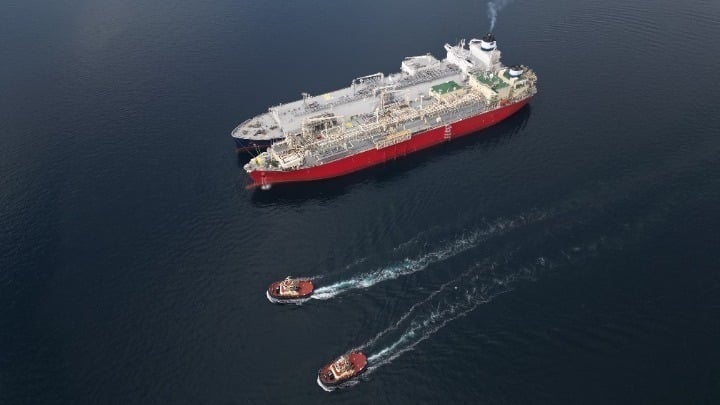

In Thessaloniki, Greece, members of environmental organizations and scientific experts voiced significant concerns on Wednesday regarding the planned construction of a floating liquefied natural gas (LNG) storage and regasification unit in the Thermaikos Gulf.
The project is planned by Elpedison, a joint venture by Italy’s Edison and Helleniq Energy. It will have the capacity to store 170,000 cubic meters of gas and deliver up to 20 million cubic meters daily.
At an event titled “Climate Crisis and Fossil Gas vs. Investments for a Sustainable Future in Thessaloniki,” speakers highlighted potential environmental and safety risks, as well as the project’s incompatibility with Greece’s climate commitments.
A recent Greenpeace survey revealed alarmingly low public awareness about the proposed LNG facility. Costas Kaloudis, head of the climate and energy campaign for Greenpeace Greece, stated that only 19 percent of Thessaloniki citizens are fully aware of the project, with another 28 percent having only vaguely heard about it.
Crucially, the survey indicated a direct correlation between knowledge and opposition: the more informed citizens are about the LNG plans, the more likely they are to oppose their development.
“LNG is natural gas cooled to -160°C for transport and storage, and it can be even more polluting than coal,” stressed Kaloudis, emphasizing the incompatibility of such projects with the drastic reductions in gas consumption necessary to address the climate crisis. He further argued, “Gas consumption must be decreasing, while these LNG units do not serve domestic needs but rather export purposes.”
The claim that LNG can be “more polluting even than coal” is supported by a growing body of research on methane leakage (also known as “fugitive emissions”) throughout the natural gas supply chain, from extraction and processing to transport and regasification.
Methane is a far more potent greenhouse gas than carbon dioxide over a 20-year timeframe, even if it has a shorter atmospheric lifespan. If these leaks are significant, the overall climate impact of natural gas, especially LNG, can indeed rival or exceed that of coal, undermining its role as a “bridge fuel.”
Dr. Costas Nikolaou, an environmentalist, explained that the proposed unit, located just 3 kilometers from Thessaloniki‘s coast, carries a significant risk of methane leaks. Methane, a potent greenhouse gas, is particularly concerning as such leaks are “not technologically treatable.”
Nikolaou warned, “It has been found in all units in the world that accidents occur. In the event that something goes wrong in the unit, the fire through the gas will spread to the sea, creating a burning lake that it is unknown how you can extinguish.”
While the LNG industry maintains high safety standards, accidents, though rare, can have severe consequences. Large-scale fires involving natural gas, especially on water, are indeed extremely difficult to extinguish, as a burning gas leak effectively fuels the fire. Incidents at LNG facilities, even minor ones, can lead to significant disruptions and environmental damage. The close proximity to a major urban center like Thessaloniki amplifies these risks.
Safety protocols for LNG terminals are rigorous, but the potential for human error, equipment failure, or external events (e.g., ship collisions) always exists. Regulators worldwide continually review and update safety guidelines based on lessons learned from incidents. The concept of a “burning lake” is a real, albeit low-probability, worst-case scenario.
Nikolaou also raised environmental concerns regarding the facility’s use of seawater, which would then be discharged back into the sea in a frozen state, potentially impacting marine ecosystems.
He pointed out that LNG regasification often involves heating the super-cooled LNG using surrounding seawater, which results in a colder water discharge. This thermal pollution can impact local marine ecosystems, affecting sensitive species and altering water chemistry. The scale of this impact depends on the volume of water discharged, its temperature differential, and the specific characteristics of the Thermaikos Gulf.
Related: Greece Becomes a European Hub for Liquefied Natural Gas
